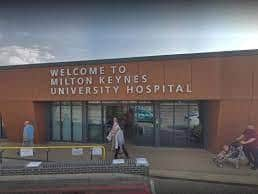Hospital comes under fire after death of 47-year-old man who was sent home from A&E
and live on Freeview channel 276
Assistant Coroner of Milton Keynes, Dr Séan Cummings has this week issued a Regulation 28 Report To Prevent Future deaths to MK hospital chief executive Joe Harrison.
He states he finds it "disturbing" that NICE health guidelines could be ignored simply because it was "inconvenient" to follow them.
Advertisement
Hide AdAdvertisement
Hide AdHe said there was a risk that future deaths could occur unless action was taken.


Dr Cummings was prompted to make the report after hearing an inquest into the death of 47-year-old Nicholas Rousseau.
Mr Rousseau died at his home on the October 9 2019, but had attended MK hospital twice over the preceding week - once on October 3 and once on October 5.
On the first occasion, when assessed in A&E, he was found to have a venous blood gas lactate level of 3.9, nearly twice the normal amount. Lactate is one of the measures of sepsis, which can be deadly.
Advertisement
Hide AdAdvertisement
Hide AdMr Rousseau was discharged - and at the ensuing inquest two A&E consultants gave evidence about much importance they would give to the lactate level.
"Dr A told me he would not repeat it because he saw lots of patients with elevated lactate and with the resources he had available he would be spending a disproportionate amount of time checking lactate levels in patients who ultimately would be fine," states the Assistant Coroner's report.
"We spent some time on the point and with reference to the NICE Sepsis Risk Stratification Tools," he added. "The guideline is clear that if a lactate is above 2 then the patient should be escalated to high risk.
"Dr A was challenged several times on his position that irrespective of the guidelines he would not routinely repeat the lactate level dismissing it as an unnecessary burden. He maintained that position."
Advertisement
Hide AdAdvertisement
Hide AdThe second doctor, known as Dr B, took a "flatly contrary view" saying she would repeat the checks irrespective of the burden of work it may generate, states the report.
"These contrasting opinions indicate a degree of confusion amongst the senior staff at Milton Keynes University Hospital Accident and Emergency Department which in my view poses a threat to patients with sepsis and with elevated lactate levels. The disregarding of the NICE Guidelines simply because it is inconvenient is disturbing," the report states..
"During the course of the inquest the evidence revealed matters giving rise to concern. In my opinion there is a risk that future deaths could occur unless action is taken. In the circumstances it is my statutory duty to report to you," it adds.
Mr Rousseau's medical cause of death was given as firstly as acute bowel ischaemia, followed by duodenal ulcer and ischaemic heart disease . The inquest conclusion was one of natural causes.
Advertisement
Hide AdAdvertisement
Hide AdThe hospital has 56 days to respond to the report and its response must contain details of actions taken or proposed actions, setting out the timetable for them.
The Citizen today asked MK hospital for a comment about the report.
Dr Ian Reckless, the hospital's medical director, said: “All staff across the Trust are strongly encouraged to adhere to relevant clinical guidelines so that the safety of the patient is always prioritised."
He added: "We would like to extend our sympathies to the family of Nicholas Rousseau and are committed to reviewing the Coroner’s comments to ensure any possible improvements can be made and appropriate measures are introduced.”